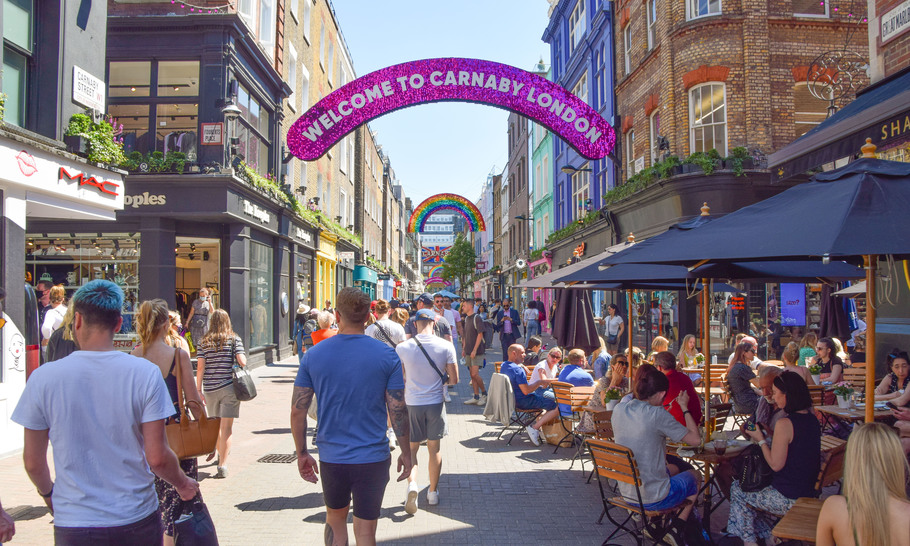The omens are good for June 21, but let’s not lower our guard quite yet

SOPA Images/SIPA USA/PA Images
Is the pandemic over? Life seems to be returning to normal, as the Prime Minister repeatedly says he “sees no reason” not to follow his roadmap and to declare Britain officially open for business in three weeks. Even the main obstacle to the lifting of all restrictions — fear that the Indian variant might trigger a third wave of Covid — no longer looks as dangerous as when it arrived from the subcontinent in April. Hotspots have been confined to a few northern towns such as Bolton and Blackburn, as mass vaccination keeps the virus at bay. So can we scrap that damned social distancing nonsense, please?
The answer is that the omens are good, but it is still too soon to lower our guard. In Scotland, Nicola Sturgeon has just decided to postpone the next stage of her reopening. The Scottish First Minister may have erred on the side of caution, but she claims to be “following the science”. And some scientists are urging Boris Johnson to do the same.
Whatever happened to the R number? Government scientists such as Sir Patrick Vallance and Professor Chris Whitty used to refer to this elusive statistic in tones of awe, as if it could reveal to us the future progress of the pandemic. We hear less about “the R” now, but it is still lurking just outside our consciousness. In fact, R has been above 1 for at least a month. That is why scientists are still worried, despite the fact that yesterday nobody died of Covid in the UK for the first time since the pandemic began some 15 months ago.
Are they right to be concerned? This is a little like asking whether police officers are right to be concerned about crime: we would have cause for concern if they weren’t. They are watching like hawks the rate of transmission of the Indian variant — which we must learn to call the Delta variant, as the World Health Organisation has renamed all variants after the Greek alphabet. (This is a curious choice, as if the magical properties of an ancient language could, like Mr Casaubon’s unfinished Key to all Mythologies in George Eliot’s Middlemarch, somehow unlock the hidden code that would enable us to discover the origins of this coronavirus — as the WHO investigation signally failed to do on their visit to Wuhan.)
The hospital statistics are promising, to say the least. Admissions are still rising slowly but appear to have reached a plateau in the low hundreds — far below the 4,000 a day at the height of the second wave in January. New cases are running at around 3,000 daily, mostly in the under-50s who have not yet been vaccinated. There are few people on ventilators — about 120 —and hardly any deaths. But we have been here before: the number of cases is similar to that in late September last year. Only a few weeks later, England returned to lockdown. What makes all the difference this time are the vaccines. Almost all the population in the nine priority categories have now received both jabs and by June 21 will have had time to build up antibodies.
Professor James Naismith of the Rosalind Franklin Institute at Harwell agrees that the Government should wait until June 14 before deciding whether to go ahead with the promised bonfire of restrictions on June 21. “We will know by that date whether or not this [the Indian variant] is a truly serious problem,” he says. “If it predominantly stays in young people, of course that means there will be less seriously ill people, but young people are not immune to ill effects.”
A sense of inevitability is now building up around the June 21 date for declaring VC (“Victory over Covid”) Day. The only thing that will stop the bandwagon would be a big spike in hospital admissions. There is still no sign of that happening. This is just as well, because the NHS is desperately trying to catch up in treating people with other serious conditions that has built up over the pandemic. Hospital waiting lists are at an all-time high, with more than five million people in the queue. Many have been waiting for years for operations and procedures, often suffering from chronic pain and constant anxiety. Any sudden new influx of coronavirus cases would derail plans to clear this backlog, which is bound to cost a growing number of lives. The longer people have to wait, the more will die. Hence the caution: because it is always operating at or near capacity, we still need to “protect our NHS”.
So the watchword is: steady as she goes. Keep the champagne on ice and go easy with the bunting for a couple more weeks. The chances of a proper summer are looking good, with glorious weather at last. Even the news on foreign travel is improving, though some key countries — France, Germany, the United States— are still wary of visitors from the UK. We need to prove to the world that we have learned the lessons of Covid and are not rushing into a premature reopening. After such an ordeal, the British public is entitled to a smooth, carefully managed transition to normality. Let’s celebrate VC Day, by all means, but we don’t need a premature lurch from pandemic to pandemonium.
A Message from TheArticle
We are the only publication that’s committed to covering every angle. We have an important contribution to make, one that’s needed now more than ever, and we need your help to continue publishing throughout the pandemic. So please, make a donation.





